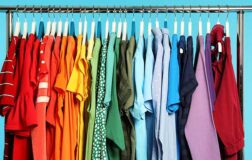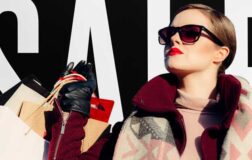Where to buy cheap work clothes
About to start an internship or a graduate job? Getting yourself a work wardrobe doesn't have to cost the world. Here's how to get smart work clothes for low prices...

Credit: marvent (left), Maksym Povozniuk (right), Rawpixel.com (background) – Shutterstock
Whether you're starting your first graduate job, doing some part-time work over the summer or heading on an internship, it's important that you have the clothes you need to make a good first impression and fit in with the workplace.
Of course, all workplaces are different. Some might require professional or formal attire, while some might keep it pretty casual. Knowing what each dress code actually means can be a nightmare.
To give you a helping hand, we've not only got a guide on where to shop for work clothes. On top of that, we'll also share what kind of clothes you should be buying for each of the main three dress codes: professional, smart casual and casual.
What's in this guide?
Best places to buy work clothes
These are the best cheap clothes shops for workwear:
- ASOS – Use your ASOS student discount to the max and check out the workwear range at ASOS. They do smart blazers, shirts and shoes as well as blouses, dresses, pencil skirts and heels. Keep an eye out for flash sales for even cheaper deals.
- Primark – For cheap work clothes, Primark is ideal. They stock loads of smart casual stuff, like shirts, trousers, skirts and dresses. However, you might struggle a bit if you're looking for more professional clothes.
- George at ASDA – Smart work clothes might not be the first thing you think of when shopping at ASDA, but their workwear range at George offers great value for money.
- New Look – Stocking menswear as well as women's clothes, New Look have a whole range dedicated to workwear at reasonable prices. Again, don't forget to make use of your student discount for extra savings.
- H&M – There's a huge range of workwear for both men and women at H&M. They have low-cost clothes that look great.
- Next – This definitely isn't your cheapest option, but if you want to invest in a timeless piece like a smart suit, Next provides good quality clothes at a fraction of the price of designer brands.
- schuh 'Imperfects' – You may have heard of schuh, but you may not have heard of their 'Imperfects' outlet. Basically, it's where they sell all of their ex-display shoes (or any that aren't in 100% mint condition) at a huge discount. From experience, any marks or scuffs are basically negligible, so it's definitely one of the best places to buy cheap trainers and shoes.
Where to find second-hand work clothes
As a more sustainable and generally cheaper option, it's a great idea to buy second-hand clothes for work when you can. Here are some of the best places to buy second-hand clothes:
- Online marketplaces – Websites and apps like Depop and Vinted are becoming super popular for people wanting to buy and sell clothes they no longer need. You'll often find high-street clothes available at great prices.
- Charity shops – You might have to do some serious rummaging to find the best clothes for work, but charity shops are full of great finds if you persevere. Save money on workwear, all while helping a worthy cause. Our charity shop shopping guide can help you get started.
- Thrift shops – Vintage thrift stores are great places to find smart second-hand work clothes. Plus, if you're working in an edgy startup or an office with a smart-casual dress code, this could be a great way to show some flair.
How to dress for a professional dress code at work

If you're working in an industry like finance, law or accounting, you'll likely be asked to stick to a professional or formal dress code.
It's also a good idea to wear smart clothing for most job interviews. If you need to dress up for an interview but don't think you'll rewear the clothes often (for example if the company you're applying to has a casual dress code) you could rent a suit or dress instead.
In a way, this is the easiest dress code to get right, as you're basically aiming to be as smart as you can. The downside, however, is that it can also be the priciest dress code to stock your wardrobe with.
Professional business clothing usually means a full suit and tie, or a suit jacket with a skirt or dress.
To keep costs as low as possible, invest in a couple of pairs of good quality suit trousers, skirts or dresses and one suit jacket. Then you can wear different shirts, tops and ties throughout the week to make sure you're not wearing a completely identical outfit each day.
Also, make sure that any clothes you buy are machine washable. The last thing you want is to splash out on an expensive suit, only to have to take it to the dry cleaners every time it needs a wash.
If you have a smart dress code at work, you might also be asked to stick to plain or neutral colours. It's best to avoid jazzy patterns or bold statement pieces.
Professional dress code clothing
These are key items for a professional dress code:
- A suit jacket or blazer
- White shirt with a tie, or a blouse/dress
- Suit trousers or a skirt (mid-length or pencil skirts are good for this)
- Smart shoes, like brogues, Oxford shoes, black flats or heels
- A laptop bag or handbag.
Unfortunately, it's still not illegal for an employer to ask women to wear high heels to work. We've got more on your dress code rights below.
How to dress for a smart casual dress code at work

Smart casual is arguably the trickiest work dress code to nail. You have to strike the balance between formal and casual, and there's a bit more uncertainty about what it means in practice.
But don't panic – it's actually pretty straightforward. For a smart casual dress code, avoid trainers, t-shirts and informal jeans and you'll be fine.
A smart casual dress code can be as simple as a casual shirt/smart top and chinos. Button-down shirts, polo shirts and dresses are generally accepted, and you usually have a lot more freedom with colour, patterns and jewellery.
Whether or not jeans are permitted is a bit of a grey area. Some companies might allow them, and others might not. As a general rule, though, we'd advise only wearing jeans if they're completely black and not clearly denim. That way, they can pass as black trousers.
In winter, jumpers and cardigans over the top of your usual attire are typically accepted.
Smart casual dress code clothing
Here are great items to wear for a smart casual dress code at work:
- A shirt, smart top or dress
- Trousers like chinos, culottes or very black jeans
- Relaxed but smart shoes or boots (think leather or suede)
- A satchel bag
- A smart coat, like a trench coat or mac.
How to dress for a casual dress code at work

Casual dress codes at work are actually quite common. If you work for a startup, or in the creative industries, it's likely the dress code will be much more relaxed.
You might think casual translates into 'wear whatever you want', but there are still some rules here.
Within reason, yes, you can wear the clothes that you feel most comfortable in. However, you still have to keep it professional, which means avoiding the following clothes:
- Tracksuits and sportswear (save it for the gym)
- Dirty clothes (your muddy trainers from the weekend will need a wipe down first)
- Football strips or other sports merchandise
- Your pyjamas (as tempted as you might be on a Monday morning).
As a guideline, as long as you're comfortable but still presentable, you're likely wearing appropriate clothes for a casual dress code at work.
Casual dress code clothing
Here are the best types of clothes to wear for a casual office:
- A casual shirt, t-shirt or jumper
- A skirt or jeans (but stay away from ripped or distressed denim)
- Boots or trainers (Converse or similar are fine, just keep them clean)
- A rucksack or shoulder bag
- Any kind type of coat or jacket.
How to dress well for work
These tips will help you find the perfect clothes for work:
-
Find out the dress code
Make sure you find out the dress code before your first day in a new job. Your manager might forget to pass this information on, so don't be afraid to ask. Doing so will save you lots of stress and hassle in the morning.
If they tell you the dress code and you're still a bit unsure, it's best to stay on the safe side and go slightly more formal on your first day. Then, if you get there and see that everyone is more casual, you can adjust your outfits to fit the dress code more closely from then on.
-
Be prepared to change your style
Depending on the industry and company you work in, you might be required to wear different levels of dress code for different work scenarios.
Say, for example, you work for a startup company. They might have a casual dress code most of the time, but you could be expected to dress more smartly if you're meeting clients or attending networking events.
You don't want to be caught out without an appropriate work outfit to wear, so prepare one or two more professional outfits just in case.
If you're keen to buy a new bottle of fragrance for work, have a read of our guide to buying cheap perfume and aftershave. -
Choose appropriate accessories for work
Most people spend so much time focusing on the clothes when thinking about the best outfits to wear for work that they forget about important accessories. The coat, bag, watch and even stationery you choose can be just as important.
You might turn up for a board meeting in a smart suit, but if you pull out a chicken nugget themed notepad from your briefcase, you're not going to create the best impression.
Make sure you think through every aspect of your outfit before you start, and you'll feel much more comfortable and relaxed knowing you've got everything covered.
-
Know your dress code rights
It's not illegal for an employer to enforce a dress code. However, if a dress code has a negative effect on you based on your age, gender, disability, religion, gender reassignment or sexual orientation, it can be classed as discrimination.
Due to this, if you feel discriminated against in any way due to your company's dress code, you're within your rights to refuse to wear what they're asking you to, and you can take your employer to court.
Usually, the only instance in which an employer can force a specific dress code, contrary to someone's religious beliefs, for example, is for health and safety reasons. For instance, they might not permit loose clothing around machinery.
Dress codes must apply to both men and women equally, although there can be different requirements. It's not illegal for employers to ask women to wear high heels, but it's a hot topic, and it often generates some bad press for employers who enforce such a rule.
Employers are also allowed to ask employees to cover tattoos and remove body piercings (especially for safety or hygiene reasons). But after some public outcry, many strict no-tattoo policies are being reconsidered.
As an example, a company has previously hit the headlines for a uniform policy that banned dreadlocks, braids and beards. It was widely condemned by the public and described as racially discriminatory. It led the company to allow exceptions for religious reasons.
Unsure what to expect in your first graduate job? Our guide explains all.








